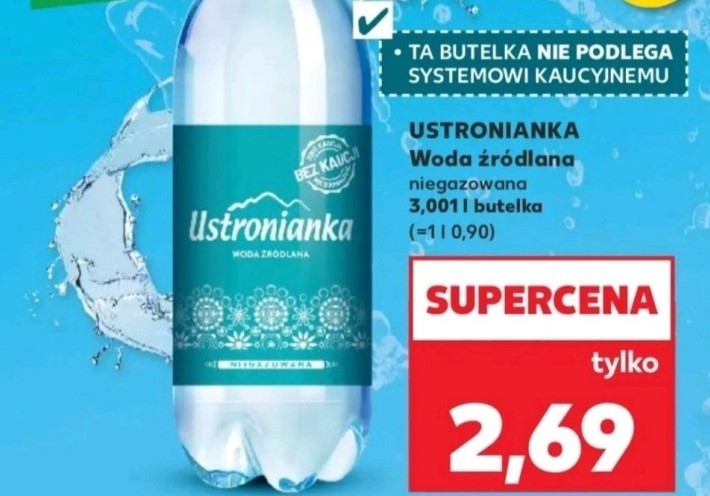Keep our news free from ads and paywalls by making a donation to support our work!

Notes from Poland is run by a small editorial team and is published by an independent, non-profit foundation that is funded through donations from our readers. We cannot do what we do without your support.
Some drinks producers and retailers in Poland have responded to the country’s compulsory new recycling system by adjusting their products to avoid the new rules – in one case selling bottles 1ml above the limit, in another switching to carton packaging.
Meanwhile, Rossman, a large drug store chain, has announced that it will stop selling any products subject to the new rules, which require customers to pay a deposit as part of the cost, with the money returned when they bring back the packaging.
The new scheme was launched on 1 October. However, the environment ministry notes that there will be a transition period as older stocks – which are not part of the deposit-return system – are sold and new products gradually replace them.
Poland has launched a nationwide deposit-refund system for plastic and metal drinks containers, with the aim of increasing recycling.
A deposit will be added to the cost of such products, with the money paid back when the consumer returns the packaging https://t.co/tuOBq5DKQE
— Notes from Poland 🇵🇱 (@notesfrompoland) October 1, 2025
Nevertheless, some companies immediately announced measures that would circumvent the new rules.
Kaufland, a large German-owned supermarket chain, published an advert for water in bottles with a capacity of 3.001 litres – exactly 1ml above the size of plastic bottles that require deposits under the new system.
“This bottle is not subject to the deposit-return system,” wrote the supermarket in its advertising of the product.
The promotion, however, quickly sparked criticism from politicians and the public. Deputy climate minister Jan Szyszko described it as “pure anti-Polish sharp practice”.
Wpływy z systemu kaucyjnego trafią do zwykłych ludzi oraz do polskich firm robiących zielone technologie. Nazwijmy rzeczy po imieniu: omijanie systemu to żadne eureka, tylko czyste antypolskie cwaniactwo.
Wstyd też dla niemieckiego korpo @kauflandpolska, które w Polsce promuje… pic.twitter.com/BSDMgqYYAZ
— Jan Szyszko (@szyszkoj) October 1, 2025
“Shame on the German corporation Kaufland Polska, which promotes such pathologies in Poland. I wonder if they do the same in their own country,” he added. Germany is one of a number of European countries that has long had a deposit-return system in place.
In response to the backlash, Kaufland Polska’s CEO, Martin Piterák, admitted that the idea had been a “mistake” and that the “product in question has been immediately withdrawn from sale”, reports news service Bankier.pl
Meanwhile, the Polish firm that produces the water bottle in question, Ustronianka, issued a statement that claimed it had been offering packaging in this particular size for 20 years. It says that it simply wants to “provide customers with a wider range of choices”.
Another Polish drinkmaker, Oshee, which specialises in sports drinks, has also responded to the new system by offering some of its products in cartons – which are not covered by the new rules – instead of the usual plastic bottles.
Oshee wprowadziło nowe opakowania, które omijają system kaucyjny.
📸 | mateuszhermanowsk pic.twitter.com/Jfi0xiRZNX
— 🌐 ᴛʜᴇᴘᴏʟᴀɴᴅɴᴇᴡs 🌐 (@thepolandnews_) October 2, 2025
The new system has led to Rossmann, one of Europe’s largest drugstore chains, stopping selling beverages in containers subject to the deposit-refund scheme altogether.
Since 1 October, Rossmann no longer offers plastic drinks bottles up to three litres, metal cans up to one litre, or reusable glass bottles up to 1.5 litres, all of which are covered by the new rules. These are being replaced with alternatives such as Oshee’s cartons.
The new system requires shops above a certain size that sell products covered by the deposits to offer customers the opportunity to return them. But Rossman says that, because it sells only a small number of such products, it does not make sense to continue.
“Every available space in stores is primarily intended for the display and storage of cosmetics and chemical products, so it is impossible to implement the deposit-refund system in its current form,” wrote the firm. It added that the legislation did not consider the specific needs of drugstores and pharmacies.

Notes from Poland is run by a small editorial team and published by an independent, non-profit foundation that is funded through donations from our readers. We cannot do what we do without your support.
Main image credit: Kaufland promotional materials

Alicja Ptak is deputy editor-in-chief of Notes from Poland and a multimedia journalist. She has written for Clean Energy Wire and The Times, and she hosts her own podcast, The Warsaw Wire, on Poland’s economy and energy sector. She previously worked for Reuters.



















